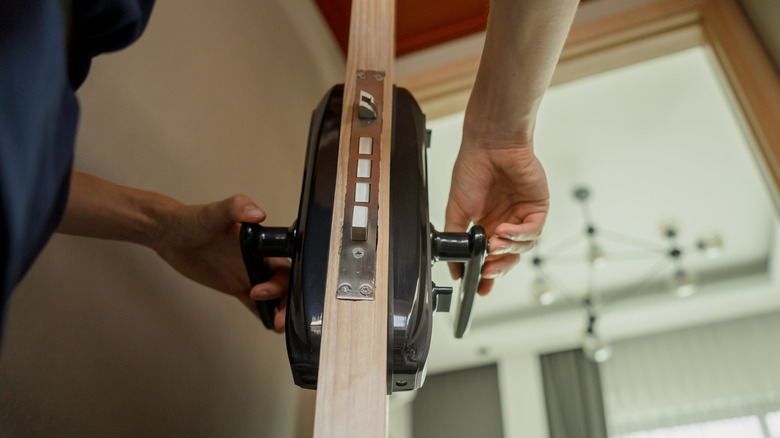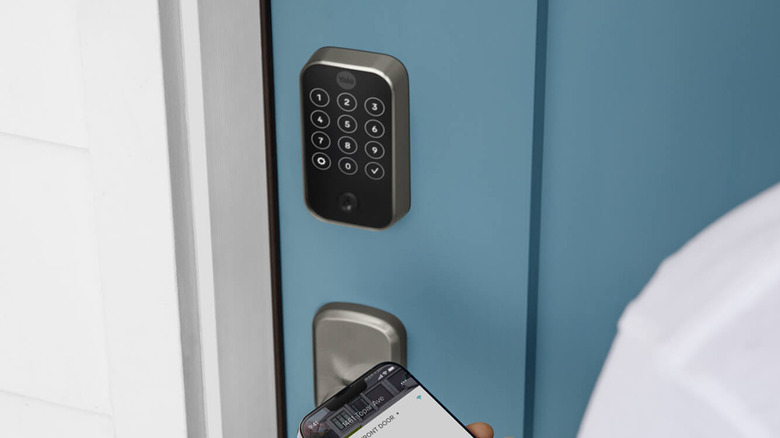Tips For Choosing The Best Smart Lock For Your Front Door
We may receive a commission on purchases made from links.
Are smart locks worth the hype? If you're forgetful, have frequent visitors, or just need more convenience in your life, the answer is yes. But with a ton of options now on the market from both familiar and unfamiliar brands, deciding that you want a smart lock is only the first step. There are a range of factors to consider when choosing the best smart lock for you, including entry type, connectivity, security, design, and more.
While conventional locks require you to use a key, that's just one option of many when you're dealing with smart locks. You can also unlock them with a code, fingerprint, and/or app on your phone or smartwatch, depending on the product. Some models will even unlock the door for you when they sense that your phone is nearby (known as geofencing). In addition to making it easier to get in and out of your home, smart locks can perform many helpful tasks. They can auto-lock the door behind you, let guests or workers in when you're not home, and track who has opened the door and when.
There are three basic types of smart locks. Full smart locks will completely replace the existing deadbolt. Retrofit smart locks allow you to keep your current keys and deadbolt while adding on smart capabilities. Whereas, doorknob smart locks replace the handle itself, with no deadbolt at all. Your best option may depend on your budget, your current lock set-up, and how much installation you're willing (or allowed) to do. Once you've chosen a lock style, you can move on to weighing other important factors.
What to look for in a smart lock
As with any lock, security is a major consideration. The lock should be durable and resistant to forced entry or picking. Look for products tested by the BHMA or ANSI, two groups that grade lock hardware on security and durability. With smart locks, digital safety is also a concern, though this is not a common threat in comparison to regular break-ins. The most popular smart lock brands also have solid digital security practices, which is a good reason to stick to trusted brands on top of using a solid password and two-factor authentication. Common and trustworthy smart lock brands include Schlage, Yale, Kwikset, and August.
Most smart locks contain a keypad with buttons or a touchscreen. But if you also want the ability to unlock your door with a regular key, a fingerprint, an app, or without lifting a finger, look for those capabilities while shopping, since not all models offer them. Moreover, you need to decide if you want to control the lock remotely, which requires Wi-Fi or Bluetooth connectivity, or if an offline smart lock is enough. Consider whether you need other features like smart home compatibility, a security camera, or an alarm. Check the lock's estimated battery life and type, and go through the reviews to see if it's been riddled with bugs or Wi-Fi issues.
Lastly, the best smart locks for your home must fit your entryway's aesthetic, whether you favor a matte black or a brushed nickel look. Expect to pay more for a smart lock compared to a conventional one, with most models costing in the $100 to $300 range.
Smart locks to consider for your home
One smart lock rated highly by customers and professional tech reviewers alike is the Yale Assure Lock 2. It's reliable, easy to use, and has a sensor that accurately detects when the door is open or shut, so it knows when to auto-lock. There's something for everyone's preferences — you can choose from keyed, keyless, Wi-Fi, Bluetooth, touchscreen, or keypad versions. All allow you to unlock with a fingerprint and are compatible with Alexa, Google Home, and Apple. It's ANSI- and BHMA-rated and performed well in Consumer Reports' testing, resisting entry by blunt force, drilling, or picking.
Schlage Encode is another popular and highly-rated product. It comes in both a full deadbolt and a handle-only version in a range of trims and finishes. It's reliable, easy to install, and the battery lasts at least six months. It offers both a keypad and a traditional key (no fingerprint option), as well as a built-in alarm and Wi-Fi. You can unlock remotely and schedule the auto-lock for when you leave the house. The Schlage Encode is ANSI/BHMA-rated and performed well in Consumer Reports' testing.
If you're not interested in remote access, an offline smart lock will likely be less expensive and still offer the convenience of keyless entry. Since keyless locks are bump-proof, these locks can be the key to a safer home. The Kwikset Obsidian comes in both connected and unconnected versions. It's highly resistant to break-ins, ANSI/BHMA-rated, and features "SecureScreen" technology to prevent people from guessing your code from the fingerprints left on your keypad. The design is low-profile and modern-looking, so it can match a range of aesthetics.


